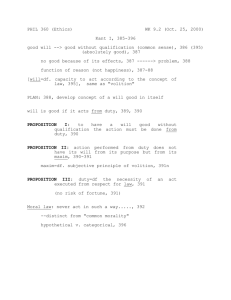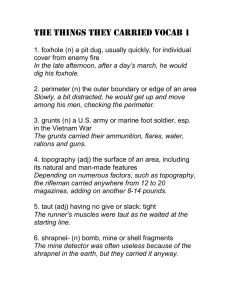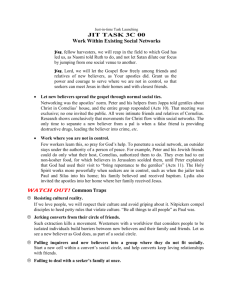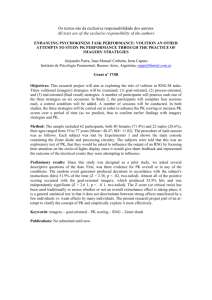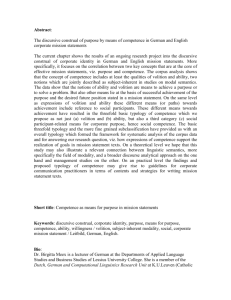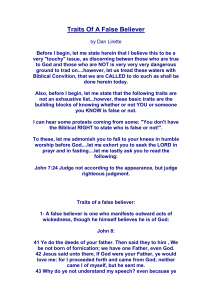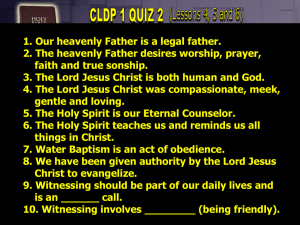Volition - Lake Erie Bible Church
advertisement
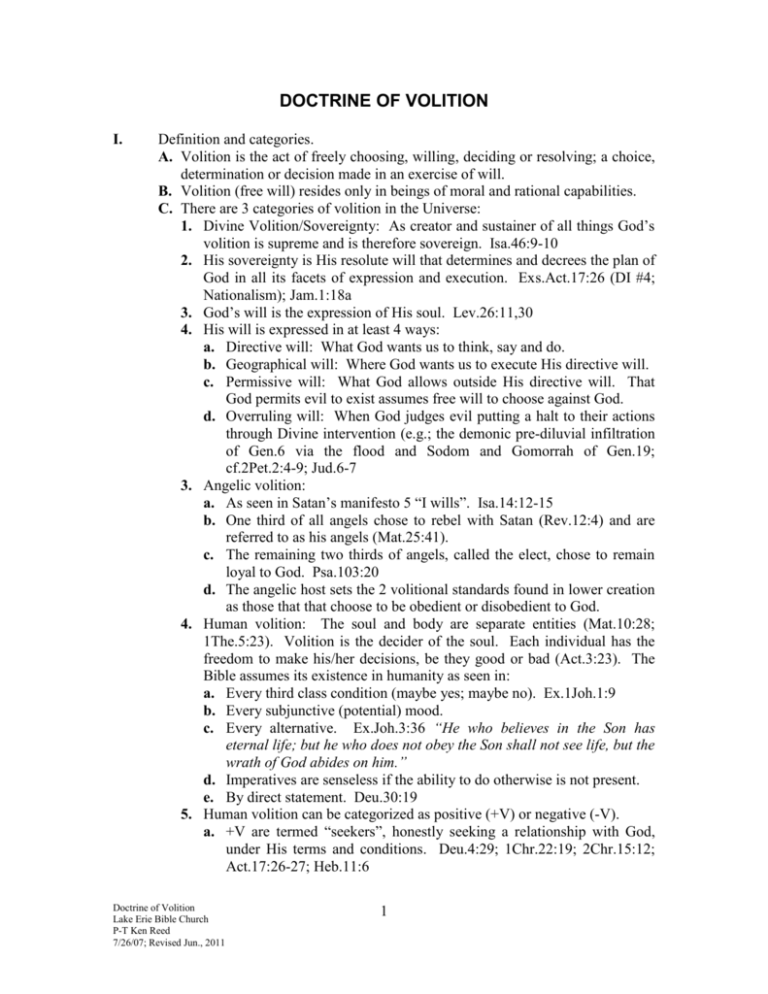
DOCTRINE OF VOLITION I. Definition and categories. A. Volition is the act of freely choosing, willing, deciding or resolving; a choice, determination or decision made in an exercise of will. B. Volition (free will) resides only in beings of moral and rational capabilities. C. There are 3 categories of volition in the Universe: 1. Divine Volition/Sovereignty: As creator and sustainer of all things God’s volition is supreme and is therefore sovereign. Isa.46:9-10 2. His sovereignty is His resolute will that determines and decrees the plan of God in all its facets of expression and execution. Exs.Act.17:26 (DI #4; Nationalism); Jam.1:18a 3. God’s will is the expression of His soul. Lev.26:11,30 4. His will is expressed in at least 4 ways: a. Directive will: What God wants us to think, say and do. b. Geographical will: Where God wants us to execute His directive will. c. Permissive will: What God allows outside His directive will. That God permits evil to exist assumes free will to choose against God. d. Overruling will: When God judges evil putting a halt to their actions through Divine intervention (e.g.; the demonic pre-diluvial infiltration of Gen.6 via the flood and Sodom and Gomorrah of Gen.19; cf.2Pet.2:4-9; Jud.6-7 3. Angelic volition: a. As seen in Satan’s manifesto 5 “I wills”. Isa.14:12-15 b. One third of all angels chose to rebel with Satan (Rev.12:4) and are referred to as his angels (Mat.25:41). c. The remaining two thirds of angels, called the elect, chose to remain loyal to God. Psa.103:20 d. The angelic host sets the 2 volitional standards found in lower creation as those that that choose to be obedient or disobedient to God. 4. Human volition: The soul and body are separate entities (Mat.10:28; 1The.5:23). Volition is the decider of the soul. Each individual has the freedom to make his/her decisions, be they good or bad (Act.3:23). The Bible assumes its existence in humanity as seen in: a. Every third class condition (maybe yes; maybe no). Ex.1Joh.1:9 b. Every subjunctive (potential) mood. c. Every alternative. Ex.Joh.3:36 “He who believes in the Son has eternal life; but he who does not obey the Son shall not see life, but the wrath of God abides on him.” d. Imperatives are senseless if the ability to do otherwise is not present. e. By direct statement. Deu.30:19 5. Human volition can be categorized as positive (+V) or negative (-V). a. +V are termed “seekers”, honestly seeking a relationship with God, under His terms and conditions. Deu.4:29; 1Chr.22:19; 2Chr.15:12; Act.17:26-27; Heb.11:6 Doctrine of Volition Lake Erie Bible Church P-T Ken Reed 7/26/07; Revised Jun., 2011 1 b. –V are those not so willing (faith or belief modified with a neg.). Joh.6:64; 9:18; Rom.3:3; 2The.2:12; Jud.1:5 c. Manifestation of either +V or –V is evidenced in obedience or disobedience to the POG. II. Vocabulary A. Hebrew 1. rx;B\ 2. ryxiB\ - bachiyr; 13x; adj.; “chosen, elect”. 3. 4. - bachar; 172x; verb; 1Sam.17:40; Psa.78:67,68; 135:4 “to choose, elect, decide for”. A cognate of the above verb, this adjective is used exclusively to indicate the relationship of the subjects to God i.e., God’s own personal choice. 1Chr.16:13; Psa.89:3 rwOxb.mi - mibcho/r; 2x; noun; “choice”. 2Kgs.3:19; 19:23 !wOcr' - rason: noun; “will, desire, pleasure”; used of God’s will, Psa.40:8; 103:21; 143:10; etc. B. Greek 1. evkle,gw – eklego; 22x; verb; “to pick out someone or something, choose, make a choice, select”. Luk.6:13; 9:35; 10:42 2. evklogh, - ekloge; 7x; noun; “a special choice, selection, election”. This noun is used only of divine selection or choice. Act.9:15; Rom.11:5,7 3. evklekto,j – eklektos; 22x; adj; “pertinent to being elected, chosen; choice”. Rom.8:33; Col.3:12; 1Tim.5:21 4. ai`re,w – haireo; 3x; verb; “to take, choose”. Phi.1:22; 2The.2:13; Heb.11:25 5. qe,lma – Thelma; 62x; noun; “will”. III. Volition preexisted the fall of man. A. God’s sovereignty determined in eternity past to reveal Himself and share His glory with other created beings. B. He willed to create beings able to freely choose to have fellowship with Him, not robots or other unthinking mechanical entities. C. His first order of moral creatures was angelic beings. Job 34:4-7 See Doctrine of Angels. D. Lucifer, the cherub God exalted to the highest rank of angelic order chose to use his volition to rebel against God’s sovereignty. Eze.28:14-17 cp. Isa.14:12-14 See Doctrine of Satan and Satanic Counterfeits E. In turn, he induced one-third of the remaining angels to also choose to participate in his revolution. Rev.12:4 F. God judged Satan and his followers and condemned them to the eternal Lake of Fire. Mat.25:41 cp.Rev.20:10 G. That sentencing was not immediately carried out (1Pet.5:8) indicates that an appeal was made by Satan to God. H. Particulars of the appeal are omitted in the WOG. Doctrine of Volition Lake Erie Bible Church P-T Ken Reed 7/26/07; Revised Jun., 2011 2 I. The appeal begins that which is known as the Angelic Conflict (A/C). J. Enter the restoration and creation of man. Gen.1 K. The creation of human life with volition was designed as extension and resolution to the conflict. L. By deception, Satan gained spiritual control and dominion over man through Adam and Eve in the garden. Gen.3:1-6 cp. Joh.12:31; 16:11; 2Cor.4:4 M. Adam and Eve chose to act independently of God’s Sovereignty eating of the tree of good and evil manifesting disobedience (-V) to God. N. This destined Adam’s progeny of mankind to be born into this world under spiritual death. Rom.5:12,19a O. God then provided a second test of human volition, the cross. P. Enter the Person of Christ in legal resolution to the A/C. Q. It was Christ’s work on the cross that resulted in the legal victory over Satan. Joh.16:11 R. The crux of the victory is the availability of God’s +R to those that believe. Rom.5:19b; 2Cor.5:21 S. While particulars of Satan’s appeal are omitted in the Bible, the 5 “I wills” (Isa.14:13-14) of Satan’s manifesto strongly suggests that the appeal revolved around volition. T. It becomes obvious that Satan directly attacks God’s Sovereignty and thus His moral integrity seeking to cause God to recuse (disqualify) Himself as Judge. U. It appears that Satan challenges God’s superiority of will (and thus rights of Sovereignty) proclaiming that he can provide evidence of a more superior will under his rule (his 5 “I wills”). V. In other words, Satan challenges God’s will for creation (His predetermined plan of Sovereignty) inferring that without allowing the admission of opposing witnesses (Satan’s plan), God cannot prove His superiority of will and thus right to rule in judgment over him. W. God’s plan of salvation through Christ evidences that superiority of will is found in +V that possesses God’s +R in alignment with His will. Cp.Joh.5:30 X. God’s plan revolving around free will proves beyond doubt that His will is superior over the will of Satan and others that are –V. Y. This further establishes God moral character of will as superior to any volition choosing for less than +R. Z. This puts an eternal close on any further challenge to God’s Divine rights of Sovereign rule over His creation as further evidenced in the overturning of each of Satan’s 5 “I wills” throughout history. IV. Human volition meets God’s Sovereignty at the cross. 2Pet.3:9 A. The negative unbeliever exalts his volition over God’s Sovereignty as God does not desire for any to perish. Eze.18:23; 1Tim.2:4 B. Those that are positive humble themselves receiving the gospel and believe in Christ and are guaranteed eternal life. Joh.6:40 V. +V and their relationship with God both in time and eternity. A. Ph1: Doctrine of Volition Lake Erie Bible Church P-T Ken Reed 7/26/07; Revised Jun., 2011 3 1. The believer upon expressing +V to the SAJG secures an eternal relationship with God escaping eternal condemnation. Joh.3:16 2. These believers will receive the normal blessings of heaven. 3. The reality is that most men will not express +V even to this degree. Mat.7:13; Joh.1:10-11 4. These manifest maximum hate for the truth of God’s plan. Joh.3:19 B. Ph2 – the believer in time: 1. Volition continues to function after the SAJG. 2. A believer can be +V or –V. 3. The issue for volition of the believer in time is their attitude towards BD. 4. Ph2 +V demands application of BD (works) or it is lip service without reality. Jam.2:17,18,26 5. The two primary adjustments +V makes are the RBAJG (1Joh.l:9) and the MAJG (1Tim.2:4). 6. The fundamental evidence of +V is the believer’s fidelity to MPR and application of BD. Joh.3:21 7. Evidence of +V believers does not exist apart from commitment to an adjusted local church. Cp.Joh.3:20 8. +V will experience blessing in time (SG2) and eternity (SG3 – see Doctrine of SG3). 9. There is an inherent danger for believers to stifle any further expression of Ph2 +V by entering a type of reversionism referred to as “the no 2nd chance category”. 10. Both the writer of Hebrews and 2Peter address this terminal condition. Heb.6:4-8 (ground = volition; rain = BD); 2Pet.2:18-22 esp. the paradox of vss.20-21 11. In both accounts, the victims are believers that are initially +V to BD under a sound ministry and then renounce the very fundamentals of the Christian faith opting for a religion that “denies” the Person and work of Christ (Heb.6:6b, “again crucify to themselves the Son of God…”; cf.2Pet.2:1, “even denying the Master who bought them…”). 12. For the Jewish recipients in Heb.6 it meant returning to the legalism of mainline Judaism renouncing Christianity. 13. For the believers in 2nd Peter it meant falling for the Gnostic unbeliever’s propaganda promoting liberalism refuting the necessity of dealing with sin in the life via Christ (RB and the MAJG in isolation of the STA). 14. Apostatizing (renouncing) the basic tenets of the Christian faith either under a legalistic or liberal approach after having been enlightened to epignosis (complete and accurate understanding of BD) can lead to “the no 2nd chance”. 15. It indicates a volitional determination to enter a type of reversionism under –V that has permanently severed itself from any further expression of +V. 16. It reflects a once +V believer deciding to emulate –V unbelievers that are so antagonistic to the truth they permanently squelch the intellectual honesty necessary to engage positive faith. Cf.Rom.1:20-21,25 Doctrine of Volition Lake Erie Bible Church P-T Ken Reed 7/26/07; Revised Jun., 2011 4 C. Ph3: All believers in eternity will evidence the superiority of positive will over negative—believers contrasted to unbelievers—believers with or without SG3. VI. Volition is self-determining as +V or –V. Mat.12:33 A. Volition is completely free to choose for itself, without coercing or force. B. While all men at God-consciousness recognize the existence of a Supreme Being, the –V simply choose to disregard and reject that fact opting for their own brand of god. Rom.1:20-25 C. –V cannot be forced to go on +V. They must resolve to do so on their own accord. The examples of the Exodus generation and the generation of Christ prove that even miracles do not convince the –V to be otherwise. D. Christ further taught this principle in Rev.22:11. VII. Volition and the Divine institutions. A. Volition is Divine institution #1 and most important of all other Divine institutions. B. All other Divine institutions are designed to protect volition allowing maximum opportunity for expressing +V. C. Divine institution #2, marriage, is designed to protect the volition of the weaker vessel in the A/C. 1Pet.3:7 D. Divine institution #3, family, is designed to nurture and protect the volition of the child until such time they are able to function on their own in the A/C. Eph.6:1 E. Divine institution #4, nationalism, is designed to protect the volition of families and nations against Satan’s plan of a one world order. Act.17:26-27 VIII. Jacob and Esau illustrate God’s attitude towards +V and –V. Rom.9:10-14 A. The difference between Jacob and Esau was not their own good or bad deeds. Vs.11 B. The difference was in their attitude towards Christ. C. Christ died for both of them (1Joh.2:2). If Christ did exactly the same thing for both, then the difference must be in their freewill. D. Esau was the recipient of judgment, while Jacob was the recipient of love and eternal life. E. God’s Sovereignty expressed itself towards Esau in judgment (hate) and towards Jacob in grace (love). F. This explains the phrase, “Jacob I loved, but Esau I hated”. G. God’s prognosis (omniscience) anticipated their respective choices and His Sovereignty expressed itself accordingly in time. H. The purpose of God according to election was realized. See Doctrine of Election and Calling IX. God’s Sovereign plan and Person is also revealed in –V. A. The Pharaoh of the Exodus, Koncharis, is case and point. cp.Exo.9:16 Doctrine of Volition Lake Erie Bible Church P-T Ken Reed 7/26/07; Revised Jun., 2011 5 Rom.9:14-18 B. Christ also died for his sins. 1Joh.2:2 C. Pharaoh was negative at God consciousness and gospel hearing. Exo.5:2 D. God revealed Himself first in love to Pharaoh and he rejected His love. Exo.7:1-13 (miracles in the royal palace) E. God then revealed Himself to Pharaoh in judgment (10 plagues) and again he was –V. F. Each successive plague served to harden Pharaoh’s heart to the truth. Exo.7:22,23; 8:15,32; 9:34 G. Since the plagues came from God and the –V from Pharaoh, the two function in concert with God’s purpose. H. This explains the phrase “He hardens whom He desires”. Rom.9:18 I. –V produces hardness of heart every time. J. Pharaoh’s –V eventuated in the evangelization of the ancient world (that generation). X. The primary hindrance to +V. A. Pride. 1. Pride (arrogance) was the initial sin of Satan and underwrites all sin activity and the attitude of –V. Cp.Eze.28:17 2. Nebuchadnezzar is case and point. Dan.4. 3. He was +V at God-consciousness, but had not believed the gospel. 4. Pride plagues him due to his position and accomplishments acting as a hindrance to faith in Christ. Dan.4:30 5. God intervened and removed the basis for his pride by inflicting the disease of boanthropy upon him. Dan.4:33 6. After sufficient time, Nebuchadnezzar came to his senses, regained his sanity and believed. Dan.4:34-35 7. God knows where +V exists and will intervene on their behalf in circumstances of life to humble the individual sufficiently to express their +V. 8. This in an unpleasant way for +V to surface if the individual is not willing to face and remove their own obstacles. Mat.5:29-30 B. While pride underwrites the motivation for all –V, it can be expressed through a plethora of traits to include materialism (Luk.18:18-27) and intelligence (Luk.10:21). XI. +V and –V categorized. A. The Bible clearly delineates between volitional aptitudes of both unbelievers and believers. B. Joh.3:19-21 defines –V of the unbeliever and the –V and +V believer. 1. Vs.19 illustrates –V of the unbeliever that loves the darkness rather than the light. 2. Vs.20 illustrates –V of both unbeliever and believer as evidences in their refusal to attach themselves to the sound truth of BD. 3. Vs.21 illustrates the +V believer that faithfully engages in their MPR, applying BD evidencing Divine good production. Doctrine of Volition Lake Erie Bible Church P-T Ken Reed 7/26/07; Revised Jun., 2011 6 C. The analogy of the cold, hot and lukewarm believers illustrates –V and +V of believers. Rev.3:14-16 1. The cold believer is the –V that has no interest in God’s plan at all and has otherwise forsaken their MPR under sound truth. 2. The hot believer is the truly +V growing spiritually under sound teaching and maintaining their course. 3. The lukewarm believer is –V and seen as the most disgusting in God’s eyes. These are believers that play +V but in reality are adhering to religious systems of truth and error, operating from the source of their STA’s in action without honor (no Divine good production). D. The Parable of the Sower clearly demonstrates –V and +V. Luk.8:4-15 1. The hardpan soil = -V of the unbeliever. 2. Soil over the bedrock = the believer +V at the SAJG but quickly goes –V due to soul fainting in the face of testing. 3. Soil with the thorn plants = the +V believer that survives testing for some time but later in life goes –V getting caught up in the details of life not finishing their course. 4. The good soil = the truly +V believer that finishes his course acquiring a considerable degree of SG3. “Either make the tree good, and its fruit good; Or make the tree bad, and its fruit bad; For the tree is known by its fruit.” Mat.12:33 Doctrine of Volition Lake Erie Bible Church P-T Ken Reed 7/26/07; Revised Jun., 2011 7
